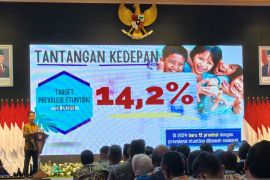"From all stages of human resource development, there is a momentum that should not be ignored at all, it is the momentum when the baby is still in the womb. At that moment, stunting threatens the quality of human resources in the future," he said at the National Coordination Meeting, which was streamed on the Kata Data YouTube channel here on Monday.
Effendy said that Indonesia's current development targets the development of quality and competitive human resources.
Meanwhile, policies to improve the quality of human resources, he said, must be pursued from the stage when they are babies, then grow into children, teenagers, and become productive human resources (15-64 age group).
"This stunting disorder will determine whether Indonesian human resources will develop well, or fail to develop. If we are free from the potential for stunting, Indonesian human resources will be superior and competitive," he remarked.
Related news: Stunting prevention policies continue to be improved: Minister
The minister said the handling of stunting in the upstream sector must be carried out from the first thousand days of a human's life. "The first thousand days of a human's life will determine the future of productive human resources in Indonesia," he said.
The problem of stunting in Indonesia is still a major challenge for Indonesia because globally the nation is still ranked 115th out of 151 countries that are experiencing stunting problems, based on a survey conducted by the World Bank in 2020, he noted.
"The stunting rate in Indonesia is currently around 27.7 percent," he said.
He said the high number of stunting cases in Indonesia has been caused by a chronic lack of nutritional intake and poor sanitation of the population due to lack of access to quality water and drinking water.
In addition, the low level of parental education and wrong parenting has also affected the national stunting rate, he observed.
"The stunting problem is also caused by a lack of health workers, especially nutritionists in monitoring the development of toddlers," said the minister.
Related news: BKKBN chief aims to lower stunting rate to 14% by 2024
Translator: Andi Firdaus, Katriana
Editor: Suharto
Copyright © ANTARA 2021












